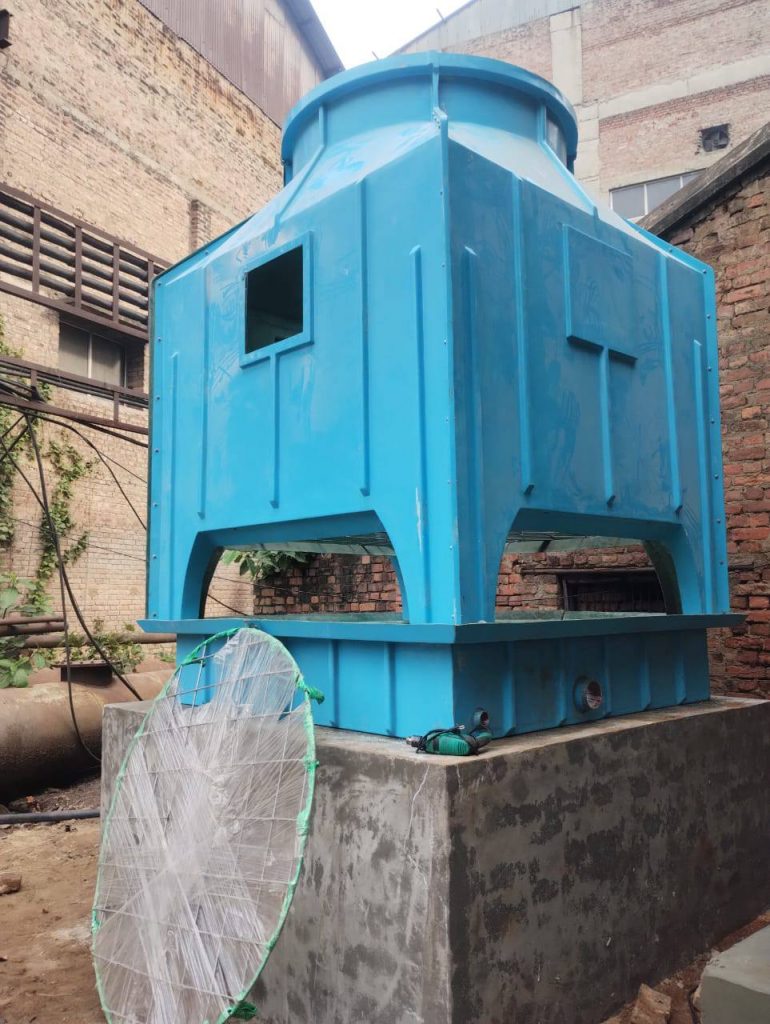Use of Cooling Towers in the Chemical Industry
Cooling towers are critical assets in chemical plants, helping to regulate temperatures in reactors, condensers, and process equipment. They ensure safe, efficient, and continuous operations by removing excess heat from chemical processes. Below is a detailed breakdown of their applications, types, and operational considerations.
1. Key Roles of Cooling Towers in Chemical Plants
Cooling towers support various chemical processes by:
A. Process Cooling
- Reactors & Distillation Columns – Maintain optimal temperatures for exothermic/endothermic reactions.
- Condensers – Cool vapours back to liquid form (e.g., in petrochemical refining).
- Crystallizers & Dryers – Control cooling rates for product quality.
B. Equipment Protection
- Prevent overheating in compressors, heat exchangers, and pumps.
- Extend machinery lifespan by maintaining stable operating temperatures.
C. Energy & Water Efficiency
- Recirculate cooling water, reducing freshwater consumption.
- Improve heat recovery (e.g., preheating feedwater using waste heat).
2. Types of Cooling Towers Used in Chemical Industry
| Type | How It Works | Best For |
| Open (Evaporative) Cooling Tower | Water exposed to air, cooled by evaporation | High-heat processes, large-scale plants |
| Closed-Circuit Cooling Tower | Process fluid isolated in coils, externally cooled | Corrosive/expensive fluids (e.g., acids, brines) |
| Dry Cooling Tower | Air-cooled (no water loss) | Water-scarce regions, zero-discharge plants |
| Hybrid Cooling Tower | Combines wet & dry cooling | Variable-load processes, energy savings |
. Industry-Specific Applications
A. Petrochemical & Refining
- Cool hydrocarbon condensers, fractionation columns, and alkylation units.
- Handle high thermal loads in ethylene and ammonia production.
B. Fertilizer & Agrochemicals
- Temperature control in urea synthesis, phosphoric acid cooling.
- Prevent thermal degradation of sensitive compounds.
C. Specialty Chemicals & Pharmaceuticals
- Precise cooling for batch reactors, solvent recovery systems.
- Closed-loop systems to avoid contamination.
D. Chlor-Alkali & Inorganic Chemicals
- Cooling electrolysis cells, chlorine compressors, sulfuric acid plants.
- Resistant materials (FRP, titanium) for corrosive fluids.
4. Unique Challenges in Chemical Plants
◉ Corrosion & Scaling – Acidic/alkaline process fluids demand titanium, FRP, or coated materials.
◉ Fouling & Deposits – Suspended solids require filtration & water treatment.
◉ Chemical Contamination Risk – Leaks can pollute cooling water (closed-loop preferred for hazardous fluids).
◉ Explosion Risks – In flammable vapor environments (e.g., petrochemicals), non-sparking fans & coatings are used.
5. Water Treatment & Maintenance
- Biocides – Control algae/bacteria (critical for Legionella prevention).
- Scale Inhibitors – Prevent mineral deposits (e.g., calcium carbonate).
- Corrosion Inhibitors – Protect metal components from acidic/oxidizing fluids.
- Filtration Systems – Remove particulates from recirculated water.
6. Comparison: Cooling Tower vs. Air Coolers in Chemical Plants
| Factor | Cooling Tower | Air Coolers |
| Efficiency | Higher (better heat transfer) | Lower (limited by ambient air temp) |
| Water Use | Yes (evaporation losses) | None |
| Footprint | Larger | Compact |
| Maintenance | More intensive (water treatment) | Simpler (no water system) |
| Best For | High-heat loads, water-rich regions | Water restrictions, small plants |
Conclusion
Cooling towers are indispensable in chemical manufacturing, enabling temperature control, energy efficiency, and process safety. The choice between open, closed, dry, or hybrid towers depends on:
◉ Process requirements (temperature range, fluid type)
◉ Water availability (scarcity vs. recycling needs)
◉ Corrosion/fouling risks (material selection)
◉ Environmental regulations (discharge limits, emissions)
